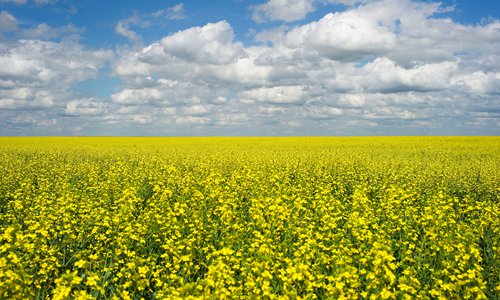HOME >> SOURCE
Canada eager to resume canola exports to China, which has found new sources
By Chi Jingyi Source:Global Times Published: 2020/4/1 18:44:56

A canola crop used for making cooking oil sits in full bloom on the Canadian prairies near Fort Macleod, Alberta, Canada. File photo: VCG
The Canadian government is pushing to resume its canola seed exports to China, the world's biggest importer. Analysts say Canada is more anxious than China to resume these exports as the latter has found new sources for canola products, and urged Canada to restore the tense bilateral relationship.
"I think Canada's effort of canola export resumption is a very positive sign. Against the backdrop of the COVID-19 outbreak and turmoil in global financial markets, there are signs of a thaw in economic and trade relations between China and Canada," Zhou Xuezhi, a research fellow at the Chinese Academy of Social Sciences, told the Global Times on Wednesday.
Zhou noted that the possible resumption of canola trade shows that the pandemic outbreak has had an impact on food security in the world.
The Canadian agriculture minister on Tuesday said in a statement that China would allow canola seed imports to continue provided shipments contained less than 1% foreign material such as straw or chaff, Reuters reported on Wednesday.
"Canada has been China's largest source of canola seed imports. The incident involving Huawei Meng Wanzhou's arrest has affected bilateral trade and had a significant negative impact on both sides. Resolving Meng's case will help restore ties between the two countries," Ma Wenfeng, a senior analyst at Beijing Orient Agribusiness Consultancy, told the Global Times on Wednesday.
Ma noted that the strained bilateral business relationship is exerting a much bigger negative impact on the Canadian side considering the abundant global supply of agricultural products. And Canada in a short term cannot find a market as big as China to absorb the canola seed products it can't export to China.
In March 2019, Chinese customs discovered harmful organisms in canola seeds imported from Canada on four separate occasions. For that reason, Canadian canola lost its qualification for export to China.
Canola exports from Canada to China were cut by nearly 70 percent in 2019, a loss of C$1 billion ($703.7 million), according to the latest data.
In 2018, before Canadian canola lost its export license, China imported over 1 million tons of Canadian canola oil, accounting for about 87 percent of China's total canola oil imports, according to customs data.
As Canada lost its license, its market share was taken up by suppliers from around the world.
A total of 37 Russian companies formally qualified to supply vegetable meal to China, including canola products, in 2019. And Russia's supply of oil and grease products to China hit nearly $600 million last year, a surge of 61 percent on a yearly basis.
Imports of oilseed from Ukraine that meet the relevant requirements were also permitted from December 2019.
Richardson and Viterra are the two companies which account for about 70 percent of Canadian canola seed exports to China. According to Canada's minister of agriculture, no agreement has been reached to allow Richardson and Viterra back into the Chinese canola seed market, citing Chinese sources which suggested all canola seed imports would resume.
Posted in: MARKETS